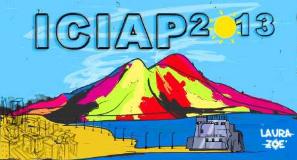 |
 |
 Institute of Intelligent Systems for Automation |
Call For Participation
ACVR
– First International Workshop on Assistive
Computer
Vision
and Robotics
in conjunction with the 17th International Conference on Image Analysis and Processing (ICIAP), Naples, Italy, www.iciap2013-naples.org
Program
Assistive
technologies provide a set of advanced tools that can improve the
quality of
life not only for disabled, patients and elderly but also for healthy
people
struggling with everyday actions. After a period of slow but steady
scientific
progress, this scientific area seems to be mature for new research and
application breakthroughs. The rapid progress in the development of
integrated
micro-mechatronic tools has boosted this process. However, many
problems remain
open especially as regards environment perception and interaction of
these
technological tools with people. The goal of the workshop is to give an
overview of the state of the art of perception and interaction
methodologies
involved in this area with special attention to aspects related to
computer
vision and robotics.
The International Workshop on Computer
Vision and Robotics
subsidiaries
(ACVR) aims
to bring together researchers
working on problems of
robotics and vision related to developing
assistive technologies. Research
papers are solicited in, but not limited to, the following topics:
· Augmented and Alternative
Communication
· Human - Robot Interaction
· Mobility Aids
· Rehabilitation Aids
· Home Healthcare
· Technology for Cognition
· Automatic Emotional Hearing
· Activity Monitoring Systems
· Manipulation Aids
· Smart Environments
· Safety and Security
Events
|
|
| The
workshop will be opened with a keynote speech from Andrea Cavallaro
(Professor of Multimedia Signal Processing at Queen Mary University of
London). The talk will address the challenging problems of "Actions, Interactions and Re-Identification in Camera Networks" |
|
Abstract Localising people and understanding their
interactions is a desirable yet demanding task for assistive computer vision
applications. This presentation will illustrate challenges and new
possibilities in video-based applications related to smart environments,
activity monitoring systems, safety and security. I will cover algorithms that
use actions to enable the synchronization of multiple data streams and the
analysis of interactions to effectively track groups of people. Moreover I will
describe algorithms and methods for predicting the movements of people across
blind spots in camera networks in order to facilitate their re-identification. The algorithms will be illustrated with
several examples from on-going and recently completed projects.
|
|
Important
Dates
Paper submission: M̶a̶y̶ ̶1̶5̶,̶ ̶2̶0̶1̶3̶ May 22, 2013
Notification
to the authors: J̶u̶n̶e̶ ̶1̶0̶,̶ ̶2̶0̶1̶3̶ June 19, 2013
Camera
ready copy: J̶u̶n̶e̶ ̶2̶4̶,̶ ̶2̶0̶1̶3̶ June 28, 2013
Workshop:
September 9, 2013
Submission
Process / Information
The Workshop proceedings will be published by Springer in the LNCS series, indexed as peer-reviewed publication in the Web of Science.
The length of the papers is max 8 pages (with references included; always an even number of pages).
Papers will be selected based on their originality, timeliness, significance, relevance, and clarity of presentation.
Authors must follow the LNCS guidelines for their paper to be published by Springer, according to Springer's Information for LNCS authors.
The submission site is: https://cmt.research.microsoft.com/ICIAPWS2013/
For Camera Ready Submission please check the detailed Instructions available at http://www.ino.it/home/leo/Events/CameraReadySubmission.html
Organizing
Committee
General
Chair:
Marco
Leo (CNR - Institute of Optics)
Danilo
P. Mandic (Imperial College of London)
Steering
Committee:
Cosimo Distante (CNR -Institute of Optics)
David Looney (Imperial College of
London)
Annalisa Milella (CNR - Institute of Intelligent Systems for Automation)
Program
Committee:
Donato Di Paola(CNR -Institute of Intelligent Systems for Automation)
Cem Direkoglu (Dublin City University)
Arcangelo Distante (CNR -Institute of Intelligent Systems for Automation)
Flavio Esposito (Boston University)
Giovanni Indiveri (Universiy of Salento)
Henry Kautz (University of Rochester)
Liliana Lo Presti (Boston University)
Pier Luigi Mazzeo (CNR -Institute of Intelligent Systems for Automation)
Markos Mentzelopoulos (University of Westminster)
Mikel Rodriguez (INRIA/ENS)
Davide Scaramuzza (University of Zurich)
Paolo Spagnolo (CNR -Institute of Intelligent Systems for Automation)
